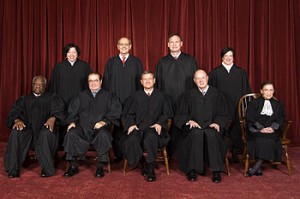January 21, 2016
 This week, the United States Supreme Court (“SCOTUS”) quietly released a landmark decision in a class action lawsuit involving allegations of Telephone Consumer Protection Act (“TCPA) violations. In a 6-3 decision, SCOTUS ruled that defendants cannot rely on unaccepted settlement offers for full relief to a named plaintiff, or offers of judgment for same, to argue that the claims of the named plaintiff are rendered moot and, therefore, warrant dismissal.
This week, the United States Supreme Court (“SCOTUS”) quietly released a landmark decision in a class action lawsuit involving allegations of Telephone Consumer Protection Act (“TCPA) violations. In a 6-3 decision, SCOTUS ruled that defendants cannot rely on unaccepted settlement offers for full relief to a named plaintiff, or offers of judgment for same, to argue that the claims of the named plaintiff are rendered moot and, therefore, warrant dismissal.
What were the allegations that brought the case to SCOTUS?
The case came to SCOTUS after class action allegations were made against an advertising agency for violations of the TCPA’s prohibition against calls to cellphones using automatic dialing systems without the prior express consent of the recipients. The U.S. Navy had contracted with the agency to send recruitment text messages to individuals between the ages of 18 and 24, but only to those who had expressly opted-in to the receipt of text messages. The putative class consisted of individuals who had allegedly received the subject text messages without providing consent. The agency attempted to have the case thrown out after the class representative refused an offer for relief (in the full amount that he would be entitled to under the TCPA), claiming that his case was rendered moot by the unaccepted offer. Ultimately, SCOTUS invoked principles of contract law to conclude that unaccepted settlement offers, and unaccepted offers of judgment, are a legal nullity and have no operative effect on depriving a plaintiff of his/her interest in a lawsuit, a vital component for dismissing a case on mootness grounds.
Anticipated Fallout from SCOTUS TCPA Class Action Ruling
This ruling is sure to have a significant effect on the way that defense strategies to TCPA class allegations are formulated. Previously a company defending against a TCPA class action could expect to at least attempt to defeat the subject class action by making an offer of full settlement to the class representative. SCOTUS has now seemingly thrown that strategic measure by the wayside. Faced with a new world order in which SCOTUS has made the defense of TCPA class actions more challenging, it is now more important than ever to take preventative measures in order to avoid being named as a defendant in a class action lawsuit. Businesses practicing in this space should be working on a regular basis with attorneys versed in the intricacies and nuances of the TCPA, the Telemarketing Sales Rule (“TSR”) and telemarketing regulation in general. This goes a long way toward making sure that a class action or regulatory complaint never gets filed in the first place.
If you are interested in learning more about this topic or if you have been served with process concerning the TCPA or your telemarketing practices, please e-mail us at info@kleinmoynihan.com or call us at (212) 246-0900.
The material contained herein is provided for informational purposes only and is not legal advice, nor is it a substitute for obtaining legal advice from an attorney. Each situation is unique, and you should not act or rely on any information contained herein without seeking the advice of an experienced attorney.
Attorney Advertising
Similar blog posts:



